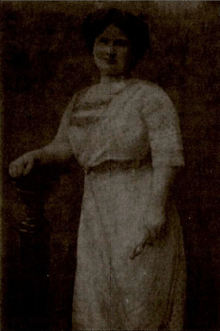Naciye Hanım
| Naciye Hanım | |
|---|---|
 | |
| Born |
Zeliha Ankuap c. 1882 Yukarı Ihsaniye, Bartın, the Ottoman Empire |
| Died |
4 December 1923 Erenköy, Istanbul |
| Burial | near the mausoleum (türbe) of Sultan Mahmud II, located at Divan Yolu street |
| Spouse | Abdul Hamid II |
| Issue |
Şehzade Mehmed Abid Samiye Sultan |
| House | House of Osman (by marriage) |
| Father | Arslan Bey Ankuap |
| Mother | Canhız Hanım |
| Religion | Sunni Islam |
Naciye Hanım (c. 1882 – 4 December 1923) was the Empress consort of Sultan Abdul Hamid II of the Ottoman Empire.
Biography
Naciye Hanım was born as Zeliha Ankuap, in the village of Yukarı Ihsaniye, Bartın as the daughter of Abkhazian notable, Arslan Bey Ankuap and his wife Canhız Hanım.[1] Her father belonged to the farming community and was the grandson of Kelesh Ahmed Bey Shervashidze, who was the head of state of the Principality of Abkhazia from the 1780s to 1808. She also had two sisters, Asiye Hanım and Pembe Hanım. At a very young age she was taken to the palace for service, by Kabasakal Mehmed Pasha, one of the compatriots of the Yıldız Palace.
According to a legend, Kabasakal Mehmed Pasha, in the palace of Anatolia, was looking for a girl for service and then went to Bartın where he heard about Naciye and immediately went to her sister Asiye Hanım, to talk about for her service in the Yıldız Palace. When she entered the palace for service, she was renamed as Saliha. However soon, during her service the Sultan Abdul Hamid II took notice of Saliha and they married on 4 November 1904 in the Yıldız Palace. After her marriage Abdul Hamid renamed her Naciye. Unlike her fellow consorts Naciye succeeded in binding the sultan to her, and became one of the two most favorite wives of Abdul Hamid II (as other being Müşfika Kadın). She also accompanied Abdul Hamid into exile in 1909 and returned to Istanbul with him in 1912.
She died on 4 December 1923 in a mansion located at Erenköy and was buried near the mausoleum of Sultan Mahmud II, located at Divan Yolu street.[2]
Issue
Together with Abdul Hamid, Saliha Naciye had two children:
- Şehzade Mehmed Abid Efendi (Constantinople, Yıldız Palace, 17 September 1905 – Beirut, 8 December 1973 and buried in Damascus);
- Samiye Sultan (16 January 1908 – Constantinople, Yıldız Palace, 24 January 1909).
References
- ↑ Bir Çerkes prensesinin harem hatıraları. L & M. 2004. ISBN 978-9-756-49131-7.
- ↑ Christopher Buyers. "The Royal Ark – Royal and Ruling Houses of Africa, Asia, Oceania and the Americas". 4dw.net.